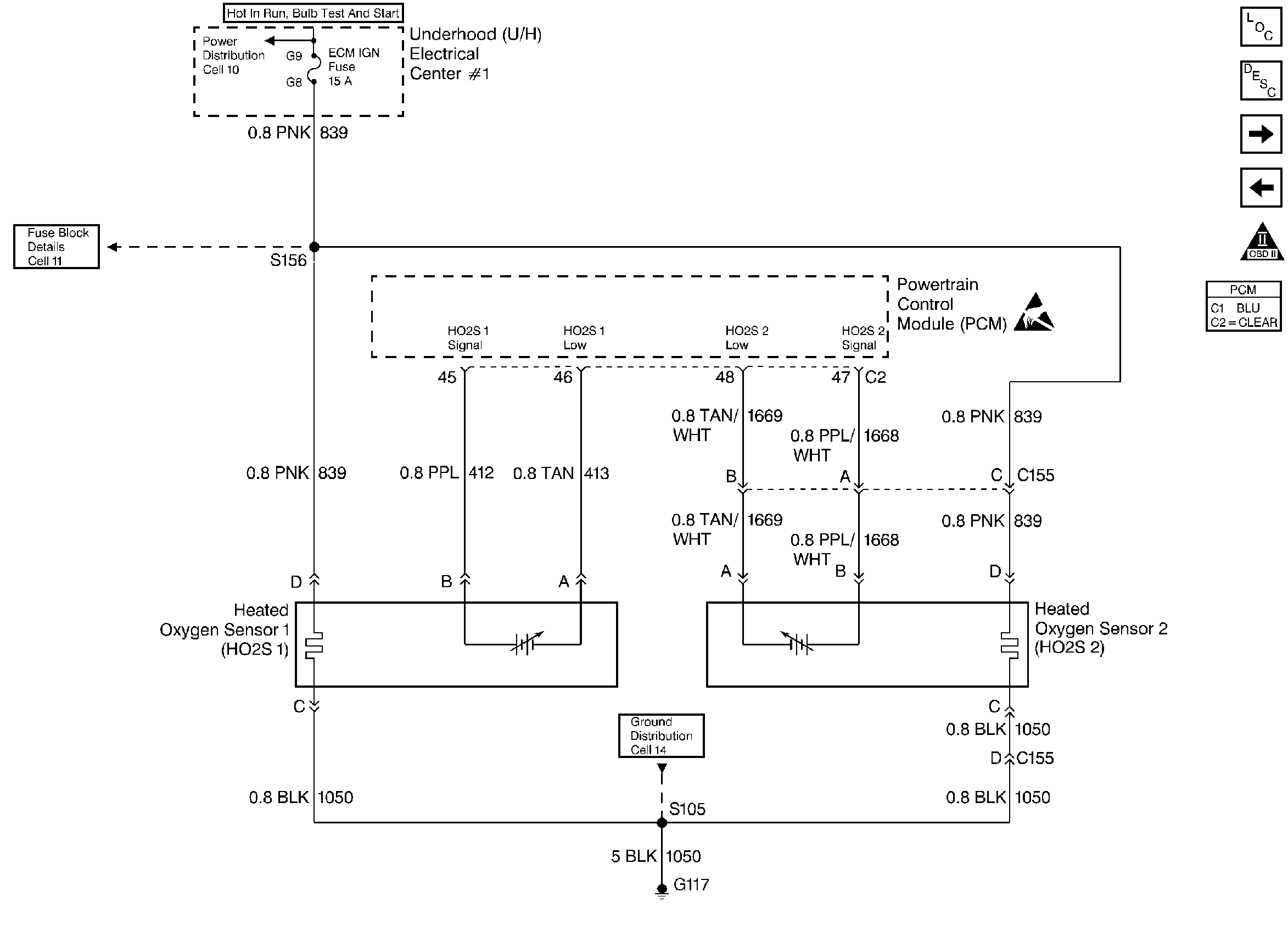Refer to
HO2S Sensors

.
Circuit Description
The PCM monitors the Heated Oxygen Sensor (HO2S) activity for 100 seconds. During this test period the PCM counts the number of times that the HO2S signal voltage crosses the rich to lean and lean to rich thresholds. If the PCM determines that the HO2S did not switch enough times, DTC P1133 will be set. A lean to rich switch is determined when the HO2S voltage changes from less than 300 mV to greater than 600 mV. A rich to lean switch is determined when the HO2S voltage changes from more than 600 mV to less than 300 mV.
Conditions for Running the DTC
| • | The engine has been running at least 60 seconds. |
| • | Engine speed is between 1000 RPM and 3000 RPM. |
| • | Mass Air Flow is between 10 gm/s and 30 gm/s. |
| • | Engine Temperature above 50°C (122°F). |
Conditions for Setting the DTC
| • | Above conditions present for a 100 second monitoring period. |
| • | The PCM monitors fewer than 40 rich to lean and 40 lean to rich switches for HO2S 1 |
Action Taken When the DTC Sets
| • | The PCM will illuminate the MIL during the second consecutive trip in which the diagnostic test has been run and failed. |
| • | The PCM will store conditions which were present when the DTC set as Freeze Frame and Fail Records data. |
Conditions for Clearing the MIL/DTC
| • | The PCM will turn the MIL OFF during the third consecutive trip in which the diagnostic has been run and passed. |
| • | The history DTC will clear after 40 consecutive warm-up cycles have occurred without a malfunction. |
| • | The DTC can be cleared by using the scan tool Clear Info function or by disconnecting the PCM battery feed. |
Diagnostic Aids
A malfunction in the HO2S heater ignition feed or ground circuit may cause a DTC P1133 to set. Check HO2S heater circuitry for intermittent faults or poor connections. If connections and wiring are OK and DTC P1133 continues to set, replace the HO2S 1. Refer to Heated Oxygen Sensor Replacement .
Reviewing the Fail Records vehicle mileage since the diagnostic test last failed may help determine how often the condition that caused the DTC to be set occurs. This may assist in diagnosing the condition.
Test Description
Number(s) below refer to the step number(s) on the Diagnostic Chart.
-
A condition that affects other heated oxygen sensors indicates probable contamination. To avoid damaging replacement sensors, correct the condition which caused the contamination before replacing the affected sensors.
-
This step checks for conditions which may cause the heated oxygen sensor to appear faulty. Correct any of the described conditions if present.
-
To avoid damaging replacement sensors, correct the condition which caused the contamination before replacing the affected sensors.
Step | Action | Value(s) | Yes | No | ||||||||
|---|---|---|---|---|---|---|---|---|---|---|---|---|
1 | Was the Powertrain On-Board Diagnostic System Check performed? | -- | Go to the A Powertrain On Board Diagnostic (OBD) System Check | |||||||||
2 |
Important: If any DTCs are set (except P1133 or P1134), refer to those DTCs before proceeding with this diagnostic chart.
Note test result; does scan tool indicate DTC failed this ign? | -- | Refer to Diagnostic Aids | |||||||||
Select DTC info, Last Tst Fail and note any other DTCs set. Did scan tool also indicate P1133 or P1134 test failed? | -- | |||||||||||
4 |
Was an exhaust leak isolated? | -- | ||||||||||
Visually/physically inspect the following items:
Was a problem found in any of the above areas? | -- | |||||||||||
6 |
Does the scan tool indicate voltage near the specified value? | 450mV | ||||||||||
7 |
Does scan tool indicate voltage less than the specified value? | 300mV | ||||||||||
Replace affected Heated Oxygen Sensors. Refer to Heated Oxygen Sensor (HO2S) Replacement (HO2S1 ) . Is action complete? | -- | -- | ||||||||||
9 | Repair condition as necessary. Is action complete? | -- | -- | |||||||||
10 | Repair open HO2S 1 low signal circuit or grounded HO2S 1 high signal circuit. Refer to Repair Procedures Electrical Diagnosis. Is action complete? | -- | -- | |||||||||
11 | Repair open HO2S 1 high signal circuit or faulty PCM connections. Refer to Repair Procedures Electrical Diagnosis. Is action complete? | -- | -- | |||||||||
12 | Replace HO2S 1. Refer to Heated Oxygen Sensor (HO2S) Replacement (HO2S1 ) . Is action complete? | -- | -- | |||||||||
13 |
Note test result; does scan tool indicate DTC failed this ign? | -- | System OK |
